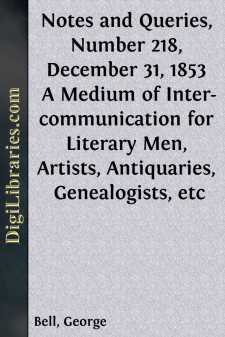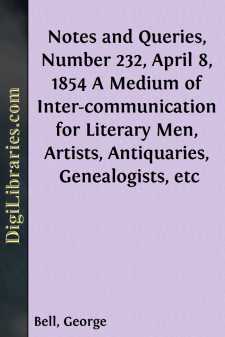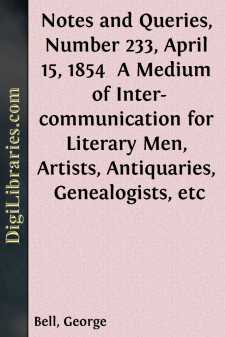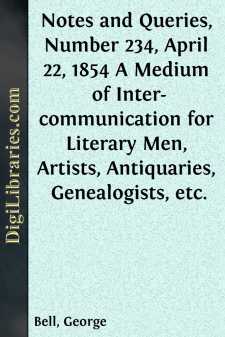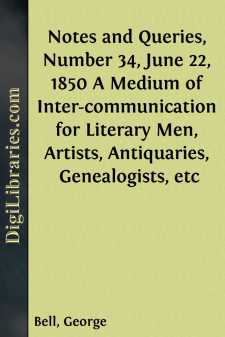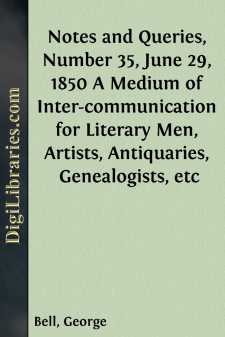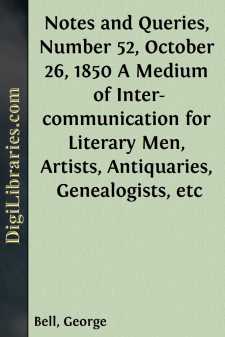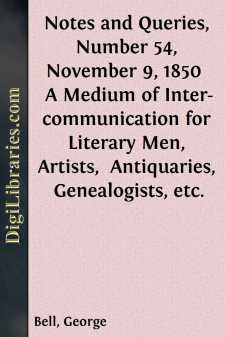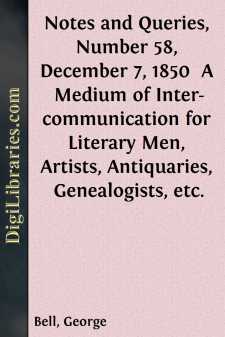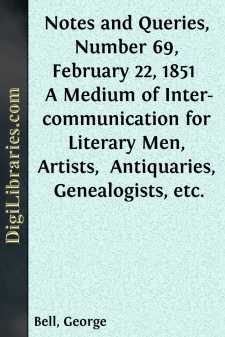Categories
- Antiques & Collectibles 13
- Architecture 36
- Art 48
- Bibles 22
- Biography & Autobiography 813
- Body, Mind & Spirit 142
- Business & Economics 28
- Children's Books 17
- Children's Fiction 14
- Computers 4
- Cooking 94
- Crafts & Hobbies 4
- Drama 346
- Education 46
- Family & Relationships 57
- Fiction 11829
- Games 19
- Gardening 17
- Health & Fitness 34
- History 1377
- House & Home 1
- Humor 147
- Juvenile Fiction 1873
- Juvenile Nonfiction 202
- Language Arts & Disciplines 88
- Law 16
- Literary Collections 686
- Literary Criticism 179
- Mathematics 13
- Medical 41
- Music 40
- Nature 179
- Non-Classifiable 1768
- Performing Arts 7
- Periodicals 1453
- Philosophy 64
- Photography 2
- Poetry 896
- Political Science 203
- Psychology 42
- Reference 154
- Religion 513
- Science 126
- Self-Help 84
- Social Science 81
- Sports & Recreation 34
- Study Aids 3
- Technology & Engineering 59
- Transportation 23
- Travel 463
- True Crime 29
Sort by:
by:
George Bell
Minor Notes. Italian-English (Vol. viii., p. 436.).—The following wholesale assassination of the English language was perpetrated in the form of a circular, and distributed among the British residents at Naples in 1832: "Joseph the Cook, he offer to one illuminated public and most particular for British knowing men in general one remarkable, pretty, famous, and splendid collection of old goods,...
more...
by:
George Bell
ARABIAN TALES AND THEIR SOURCES. The Arabians have been the immediate instruments in transmitting to us those Oriental tales, of which the conception is so brilliant, and the character so rich and varied, and which, after having been the delight of our childhood, never lose entirely the spell of their enchantment over our maturer age. But while many of these tales are doubtless of Arabian origin, it is...
more...
by:
George Bell
THE TOPOGRAPHER & GENEALOGIST, EDITED BY JOHN GOUGH NICHOLS, F.S.A. The XIIIth Part of this Work is now published, price 3s. 6d., containing: Some Account of the Manor of Apuldrefield, in the Parish of Cudham, Kent, by G. Steinman Steinman, Esq., F.S.A. Petition to Parliament from the Borough of Wotton Basset, in the reign of Charles I., relative to the right of the Burgesses to Free Common of...
more...
by:
George Bell
Minor Notes. Tippet.—The origin of words signifying articles of dress would be a curious subject for investigation. Tippet is derived by Barclay from the Saxon tæppet; but I find the following passage in Captain Erskine's Journal of his recent Cruise in the Western Pacific, p. 36. He is writing of the dress of the women at the village of Feleasan, in the Samoan Islands: "And occasionally a...
more...
by:
George Bell
THE "AGAPEMONE" OF THE SIXTEENTH CENTURY. As it is not generally known that the "Agapemone" had a prototype in the celebrated Family of Love, some account of this "wicked sect" may not at this moment be without interest to your readers:— "Henry Nicholas, a Westphalian, born at Munster, but who had lived a great while at Amsterdam, and some time likewise at Embden, was the...
more...
by:
George Bell
GEORGE GORING, EARL OF NORWICH, AND HIS SON GEORGE, LORD GORING. G.'s inquiry (Vol. i., p. 22.) about the two Gorings of the Civil War—a period of our history in which I am much interested—has led me to look into some of the sources of original information for that time, in the hope that I might be enabled to answer his Queries. I regret I cannot yet answer his precise questions, when Lord...
more...
by:
George Bell
ADDRESS TO OUR FRIENDS. We this day publish our fifty-second Number. Every Saturday, for twelve months, have we presented to our subscribers our weekly budget of "Notes," "Queries," and "Replies;" and in so doing, we trust, we have accomplished some important ends. We have both amused and instructed the general reader; we have stored up much curious knowledge for the use of...
more...
by:
George Bell
ENGLISH AND NORMAN SONGS OF THE FOURTEENTH CENTURY. In a vellum book, known as The Red Book of Ossory, and preserved in the archives of that see, is contained a collection of Latin religious poetry, written in a good bold hand of the 14th century; prefixed to several of the hymns, in a contemporary and identical hand, are sometimes one sometimes more lines of a song in old English or Norman French,...
more...
by:
George Bell
FURTHER NOTES ON THE HIPPOPOTAMUS. The following remarks are supplementary to a note on the hippopotamus in Vol. ii, p. 35. In that note the exhibition of the hippopotamus at the Roman games is not traced lower than the time of the Emperor Commodus. Helagabalus, however, 218-22 A.D., had hippopotami among the various rare animals which he displayed in public as a part of his state. (Lamprid. c. 28) A...
more...
by:
George Bell
THE ROLLIAD. (22d Ed., 1812.) Finding that my copy of The Rolliad ("Notes and Queries," Vol. ii., p. 373.) contains fuller information regarding the authors than has yet appeared in your valuable periodical, I forward you a transcript of the MS. notes, most of which are certified by the initial of Dr Lawrence, from whose copy all of them were taken by the individual who gave me the volume. W....
more...


